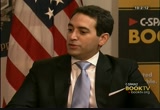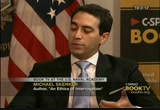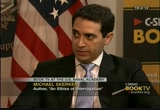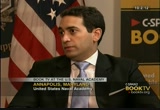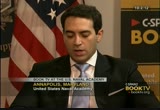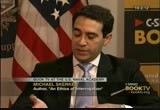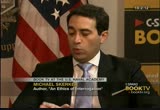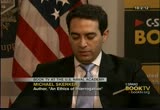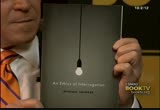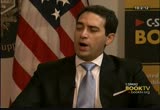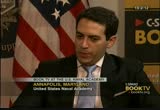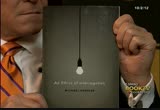tv Book TV CSPAN November 11, 2012 1:00pm-1:20pm EST
1:00 pm
were in, we felt safe and comfortable there. and i feel like my father, he wanted us to have an education. he knew that education was the key to a better life, but i really think he got -- he thought all of us would come right back home and try to work from there. >> you can watch this and other programs online at booktv.org. ..
1:01 pm
this interview as part of book tv college series, about 20 minutes. >> and your watching book tv on c-span2. one of the things we do is visit campuses around the country. it gives us a chance to talk with professors who are also authors, and today we are at the u.s. naval academy in annapolis to maryland. joining us is the author of this book, michael skerker, an ethics of interrogation is the name of the book published by the university of chicago press. professor, first of all, what do you do at the naval academy? >> i am an ethicist. to see at this glass that all
1:02 pm
the answers have to take in some upper levels las, religiousyy studies and that they courses. >> would you say your book is a philosophical book or a how to interrogate book? >> it is a work of philosophy. the principal question is under what circumstances can a statey ask more demand to know the secrets of its citizens.y there are some practical dos and don'ts as well. >> what is the geneva convention that we always talk about? >> the geneva convention to protect pow's signed in 1948. >> and how did that come about? what will does it play inyyy interrogation?yyyyyyy >> sure.yyyyyyyy throughout much of the historyy of warfare, prisoners-of-waryy were treated at the mercy ofyy their captors, which is usually badly, either sold for ransom,y and slaves, or summarily murdered.xyyyyyyyyxy
1:03 pm
two main principles, pows should not be prosecuted for their combat violence and they should be not punished in detention which are operationally meant that they should be treated in conditions on par with the conditions enjoyed by the troops of the detaining power. so -- >> is their age interrogation aspect? >> what is says is detainees cannot be tortured mentally or physically, subjected to cruel or unusual punishment. and so that has been cast doubt as saying, you can't be subjected to corset techniques. you can't be threatened with the loss of privileges if you fail to cooperate.
1:04 pm
you cannot have your food or medical care taken away, and you certainly cannot be physically abused and the kind of way. >> professor, when his interrogation immoral? >> well, i would say to any time the physical messes are used for couple of reasons. first of all, whether it's a law enforcement and interrogation or a military or intelligence interrogation, usually the detainee is a suspected criminal or suspected irregular combatant , not known for certain that this person has done anything meriting any kind of course of treatment. so if you start torturing people, you are summarily punishing people who may very well be innocent. particularly encounter in certain situations, more often than not, the interrogators interrogating an innocent person who has just been caught up in some kind of sweet. second, even if you do have a prisoner of war in in in uniform or a confirmed or well-known
1:05 pm
gang member, he is not physically being violent when he is in the interrogation booth. the basic argument rooted in human rights is that you can only be violent with people if that is the only way to halt their immediate imminent violence. so you are acting disproportionately if you're being violent toward them. >> so that is the moral argument in your view. >> yes. >> what about the legal argument? what is a law fall? >> even more restrictive. the law says quite clearly with any kind a detainee, whether it is a domestic, criminal suspect or a pow or suspected irregular combatant in match national setting, you can't use any kind of force. you can't use mental torture. you cannot subject a person to cruel or degrading punishment or cruel or degrading treatment of any kind. >> what about the u.s. lost? do you agree with the current
1:06 pm
u.s. laws on interrogation? >> yes, because they are restrictive in this sense that i just gave no kind of course of treatment is permitted. detainee's, whether they are suspected, domestic criminal suspects have a right to counsel. they have a right to remain silent, which i think is appropriate since it is not certain that they're guilty. the protections afforded to suspected irregular combatants are less specific. they should be afforded council which is not always done because if you are, say, a person in afghanistan and his capture by foreign troops to accuse you of being a terrorist, you might be a terrorist, or you might just be a go of her. you should have the same kind of protections against wrongful suspicion and conviction that an
1:07 pm
american would. >> used the word domestic. difference between domestic u.s. citizens to my enemy combatants? what are your regular combat is? >> sure. okay. a regular combatant is a person that is part of an organized group, political ends that is either not part of a conventional, unit, probably not wearing uniforms, not equipped by a state. this combat might be serving a failed state, a regime that is just been toppled and therefore fighting an insurgency, or they might be a rebel group like in a hing a see a government, or they might be fighting a foreign occupation. in that respect there are nine representing international recognize states, but recognizing some kind of potential state. also, you could have conventional soldiers using your
1:08 pm
regular tactics. there were examples of that in world war ii, living off the land, operating at a uniform, operating outside the regular logistics' training of a conventional military coming using guerrilla tactics, hit-and-run techniques, but we jobs, things like that. >> and for american citizens, though, are the protections different? are the stronger? >> i would argue that in terms of human rights of people have this same set of human rights, which include right against arbitrary detention, arbitrary accusation, rights against abuse , right to retain privacy, right to refuse personal questions asked by strangers. now, what i do think is different is the powers of the government. so if you are a law-enforcement agency you have more liberty to act in certain ways against citizens of your own country versus foreign citizens because
1:09 pm
there is a justification for american police to interrogate me or you if they suspected of wrongdoing is ultimately they're trying to protect all of us and create a relatively crime free environment for americans. if u.s. state agents see, say, and pakistan the are you many or afghans citizen, they are not operating to protect or suppress crime in those countries, they're acting in u.s. interest, so they cannot claim to be acting in the interest of the afghan go her when they see him come bundled him off, and put him in a cell for days and days. so they are actually more limited. they have less justification for doing what they're doing, more levity of operating when they're working with domestic citizens. >> professor, water boarding became a big issue a couple of years ago and the worse. is water boarding immoral? >> i believe it is. it is a course of technique that
1:10 pm
, it's the type of violence that is being used against someone who's not been violent. further, the assumption is that somehow this physical discomfort will make somebody speak the truth. there is no direct correlation between causing pain or discomfort in making someone speak the truth. so therefore is disproportionate. it is disconnected. you are hurting somebody in the hope that they reveal to you the truth. again, the reality is in any time you use coor's techniques more likely than not you are doing in on an innocent person who will then no doubt speak, say things, say things in a perhaps, that you wanted to say, and that will besmirch the whole intelligence gathering process because you will then thing, though, we actually got a terrorist emigrate. we should keep doing this. the mall we heard in the more he talks. meanwhile this is an innocent person who is. nonsense to get you to stop
1:11 pm
administering them. >> what are some of the frequent questions you get from the cadets here at the naval academy and interrogations? >> they tend to be practically minded folks and often want to know what actually works and actually does not work. i think many of them to not -- let me put it this way. there happy to hear that course of techniques are unreliable because they don't want to be asked to do those sorts of things. i think many of my may shipment are tough minded people, and they're willing to do difficult things to serve their country, but they hope this is not one of the things that would be asked to do. >> michael skerker, one of the examples that we often hear about is, somebody has a nuclear bomb. they will kill x number of people unless we figure out where that bonn is. where are the moral and practical lines drawn in a case
1:12 pm
like that in your view? >> right. the famous ticking bomb experiment. i agree with a philosopher named david lubin who call that an intellectual fraud, that experiment. because it is so counterfactual, so unlikely to ever kirk, and clearly it is conjured up in order to justify certain behaviors. again, the reality is that when you are renting terrorist it is very rare that you have someone who is a confirmed terrorist. very read the you have a confirmed terrorist to really does, and you know he does, have an active part of this kind of sort that you describe. and then, of course, even if you do have all those variables isolated, there is no telling that he will actually tell you the truth if you torture him. if he doesn't go into shock, if he doesn't like you, and again to mahdi has to do is live you for all of it until the bomb goes off. so i think the smartest play for
1:13 pm
estate agent is to invest in other modes of intelligence gathering at that point and to invest in non course of interrogation techniques that largely to work, don't have the liability issues, and don't destroy people's rights as well. it. >> what kind of freedom did you have, academic freedom. the u.s. naval academy? he taught at the university of chicago. do you have the same freedoms regardless of what the government policy maybe jack. >> i am told complete academic freedom. that said, i do work for the government, so i don't want to embarrass by employers and make them uncomfortable. so some of my colleagues said this is well, a little bit of self-censorship, labatt of extra thought that goes into the four you publish something give the
1:14 pm
house something might be misconstrued and waved about in the media. >> you talk about the fifth amendment. how does that play? >> sure. >> fascinatingly, i find it fascinating. in reading law review journals about the right, compelled, was struck by was that most legal scholars can agree on why this amendment was included in the constitution. why this was thought an important privilege to protect. various historical periods. they have about a 400 year lineage. counterintuitive, the idea that we know you have criminal information. the one you tell us, but you don't have to. we will force you tell us. and i think the best way to wrap our heads around that is to
1:15 pm
remember that when this state capture somebody, when they arrest somebody on suspicion of wrongdoing, the state agent, the police officer, can know for certain if this person actually did something bad. if the person actually is concealing a plot, actually did something terrible, he does not have a right to that criminal informations. that's not like up privilege, like a lovers' confidence. he should reveal that. he has no justification to sit on that information. if he knew for certain estate agent could take proportional steps to compel the man to review it. incentivized and a bribe. but again, the police officer does not know for certain if the person really has information. so they have debt treat the suspect largely as an innocent person, as someone who might well just have bad the wrong place at the wrong time. and so i think the more reason behind the privilege is because
1:16 pm
the state can't be sure that you're guilty. has to treat you hands-off as if your innocent person who can choose to talk or not to talk to strangers. >> how much intimidation do you think should be allowed in interrogation? >> there are a couple of issues with intimidation. first, if you intimidate somebody into talking there is no telling whether that's true not. as to give way to get a false confession, by intimidation, threatening, hurting. and so ideally you want to develop a report with the interrogate he said that they not quite trusted, but respect you and are willing to cooperate with you. you incentivized their cooperation in such a way that they're willing to give you a full narrative. if they are reacting out of fear you can't trust the reliability of that information. second, again, with any kind of suspect, they may be perfectly
1:17 pm
innocent. it is immoral to intimidate or terrorize people who have done nothing wrong. >> what about threats? >> sent thing. that you are potentially terrorizing, threatening, an innocent person. so that's a bad thing. and threats reduce the reliability. >> well, michael skerker, we talked about philosophically interrogation, but if you are in afghanistan, in a small village, isolated, the rules differ? >> no, and that is why we have rules. that's why we teach rules like this in places like the academy, places like the military intelligence school so that when you're in the field you're not just making a busy go along and you have some moral principles to draw upon and you have an understanding of why these principles and lazar in place, what the value of the mess. the value to your admission any action will intelligence and
1:18 pm
also your mission in winning the hearts and minds and not endlessly inconveniencing are terrorizing indigenous people. and so ideally, of course to my does not always work. ideally interrogator's will have a moral compass inside them that dads in miniature path they're in the field. >> professor, looking back at how we prosecuted the wars when it comes to interrogation, issues, how would you judge our behavior? >> for the most part it's been poor. we were ill-prepared for the interrogation standpoint. the cia had no trend interrogators. the military had largely -- the military did and to an extent still does treat interrogation as a low-skilled military operational specialty, and low-skilled jobs that 18-20 year
1:19 pm
olds can do and therefore it does not invest, did not invest much and training. has improved a bit, but certainly they do not invest much energy into trading. for example, an army recruit who goes to military intelligence school would get three days of training in interrogation techniques, only three days. so frankly, much of our interrogation was not competent. it had to be farmed out to contractors his varied in quality. the fbi had some skilled interrogators and some of the best intelligence we got from high-value detainees came from high-level special agents and the fbi. but for the most part this nation was caught flatfooted, well-prepared to do large-scale interrogations', and we have slowly, slowly tried to improve that. i think to the obama administration's credit when he came into office to set up something called the high
145 Views
IN COLLECTIONS
CSPAN2 Television Archive
Television Archive  Television Archive News Search Service
Television Archive News Search Service 
Uploaded by TV Archive on

 Live Music Archive
Live Music Archive Librivox Free Audio
Librivox Free Audio Metropolitan Museum
Metropolitan Museum Cleveland Museum of Art
Cleveland Museum of Art Internet Arcade
Internet Arcade Console Living Room
Console Living Room Books to Borrow
Books to Borrow Open Library
Open Library TV News
TV News Understanding 9/11
Understanding 9/11

